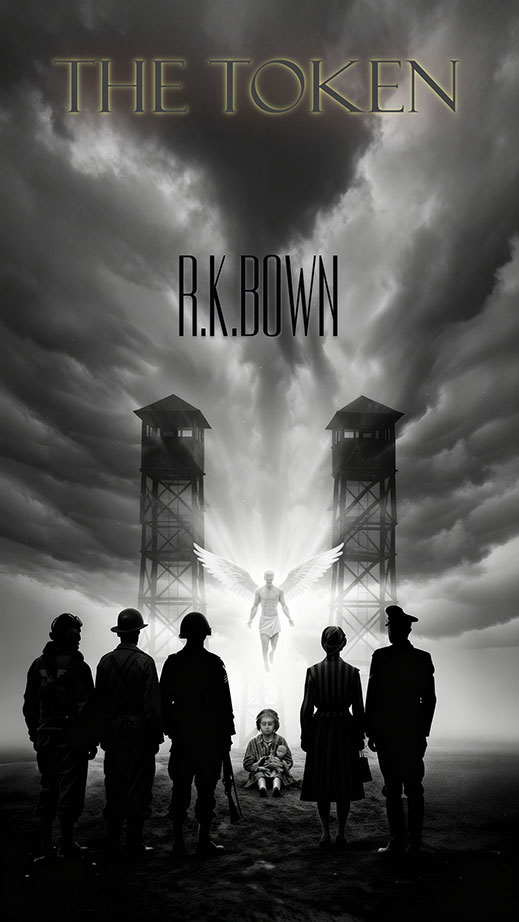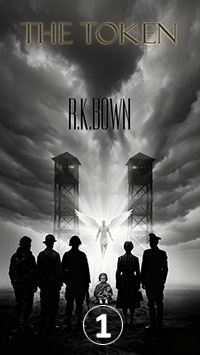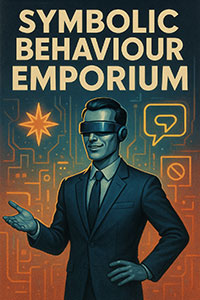THE FASCINATING WORLDS OF
R.K. BOWN

Captain Steven Kane is an RAF Lancaster bomber pilot about to go on his final mission. He is tired of the killing, weary of seeing comrades blown out of the sky on every mission, confronting the empty chairs each morning in the mess hall. On his return, he has resolved to take a desk job and marry his sweetheart Enid Porter. Together they intend to live out their idyllic lives in a cottage by the coast. So, he is willing to do anything to get his men home safely one last time.
Sergeant Daniel Brogan is an American marine about to take part in the momentous D-Day invasion. Along with thousands of other marines, he will be landing on Omaha beach. His wife back in the States is about to give birth to their first child and according to his commanding officer he is sure to be back home with them by Christmas if all goes well. He has already seen the misery of war in Italy and is determined to do whatever it takes to get back to his unborn child.
Hauptmann Conrad Mundt SS is recently back from the horror of the Russian campaign where he was wounded by a sniper. Ordered by his fuhrer to not retreat or surrender, he watched his fellow soldiers being massacred or simply freezing to death in the frigid Russian winter. Now, he has been put in charge of a section of the defenses at Omaha beach under his previous beloved commander in Africa, Field Marshall Rommel. He is confident the allied invasion will be crushed. His supreme belief in the might of Germany and its final victory is unwavering.
Maxamillion Beck is a German industrialist. While he profits producing the bombs and bullets the third Reich use to destroy its enemies, he hides a shameful hypocrisy. For if the third Reich knew of his true Jewish ancestry, they would seek to destroy him. Beck’s heritage is kept secret by the whim of a corrupt German officer paid in gold from Beck’s substantial personal fortune. His wife Hannah is pregnant with their first child and he realises the day is coming when he must flee his homeland for the safety of America to keep his family safe.
Anna Schmidt is a German housewife. Her husband Josef works at the Beck munitions factory and they have a daughter, Edith, aged one and a son Karl aged nine who dreams of being a fighter pilot for the Luftwaffe. Anna has delighted in a Germany cowing the world into submission but now the whispers of invasion threaten her idyll. She longs for a final German victory and the destruction of the Jews because she has been told by her beloved Fuhrer that they are Germany’s ultimate enemy.
As the allied invasion unfolds on June 6, 1944, these five individuals have one thing in common.
They will all die a violent death on this day.
But their journey does not end with their demise because they find themselves on a plane of existence that lies between life and death, Heaven and Hell, where they encounter the Guardian. He was also once a soldier who existed two thousand years before the events of D-Day, a man with his own dark tormented past.
The five spirits learn that their lives and deaths intersect and the fate of their eternal souls are now inextricably bound to each other. The guardian is to take them on a journey, one he has undergone many times himself in search of atonement for his own sins. They are tasked in retrieving an earthbound token that will allow them to escape their ultimate denouement and return them to their previous lives unharmed, allowing them the opportunity of forestalling their violent deaths.
This is not an impossible object as they all believe it must surely be. It is not to be found on the tallest mountain or in the depths of the deepest ocean. It is not too heavy to carry or too small to find. It is a simple object that a hand can simply reach out and take with ease.
The stakes could not be higher because if one fails in this quest, they all fail and will be consigned to a dark fate that they dare not contemplate.
As the five spirits embark on this undertaking, they soon realise that their very souls are on trial and in locating their final objective they will confront all the horrors of humanity and their own evil.
Faced with an eternity of oblivion or some hell devised torture, they will all wish that the token was indeed to be found on the highest mountain or in the depths of the deepest ocean.
My own creative journey began at the age of four, playing in a friend’s garage which had magically metamorphosed into a spaceship. Several old car parts were utilised as the navigational console or the alien detector. Plastic toy guns became laser cannons with which we would fend off otherworldly invaders. The garage’s mottled opaque windows were the viewing screen through which we would see spaceships, planets, stars and asteroids.
My reading fare aged six to nine was Marvel and DC comics. The bright colourful images and simple dialogue was easy for my young mind to digest. We would run around the back streets of our terraced houses playing the superheroes we loved. With my Superman cape blowing in the wind – an old towel around my shoulders – I would fight supervillains and aliens. It was evident, even then, that I possessed a vivid imagination. Long before the dawn of Star Trek and many decades before the advent of the Marvel and DC film universes.
As a teenager, I began reading science fiction novels. Frank Herbert’s Dune series; E. E. Doc Smith’s Lensman books; Asimov and Clarke; Heinlein and Philip K Dick. On television I loved Dr Who, Lost in Space, Battlestar Galactica, Star Trek, to name but a few. My parents would accuse me of having my head in the clouds. And they were absolutely right.
Later, as a young man in the 1980’s, my first wife introduced me to dance and the sensual writhings of Hot Gossip. I took classes with her and eventually we started our own dance group incorporating mime and robotic dancing long before it ever gained any popularity in the mainstream. This futuristic dance style attracted the attention of a band who initially wanted me to play the part of a robot on stage. Gradually, I began to augment my dancing within the band by playing basic keyboard parts on a cheap synthesiser, a role which expanded still further until I was writing, performing and recording my own songs with a more sophisticated instrumental set up. About the same time I ran a live music venue, worked on regional radio featuring local bands and contributed to a magazine, writing reviews and interviews of local musicians.
It was as though someone had dropped a match into a box of fireworks. My creativity exploded, becoming both frenetic and compulsive. There were not enough hours in each day to feed my many artistic endeavours. One day I’d be writing a song; the next day doing a radio program; then conducting an interview or writing an article; and then playing a gig with one of my three bands. And all while working full time. My passion was both a gift and a curse.
Everything I attempted was restricted by my many collaborators, often at the whim of their apathy and indifference. My single-mindedness and feverish enthusiasm was rarely equalled or reciprocated and so I ploughed a lonely, frustrated furrow. On reflection, many years later, I realised my expectations were both unreasonable and exasperating.
Then one fateful day in 1982 everything changed.
In the autumn and winter of 1982, I was employed at a hotel working split shifts, early mornings and evenings with afternoons off. There wasn’t much to do in the dark, wet afternoons other than the occasional trips to the cinema.
Star Wars had come out in 1977 and wowed the world, followed by The Empire Strikes Back.
Star Trek had aired with The Motion Picture and then the superb, The Wrath of Khan.
We believed a man could fly with Christopher Reeve’s stunning Superman.
Ridly Scott’s Alien had shocked audiences but it was his next film, the atmospheric, low key, film noir, Bladerunner, that I went to see on that fateful afternoon.
I left a cold, wet and dismal December day outside the cinema entrance and when I emerged a couple of hours later, the day hadn’t changed, but I had.
I guess people would say I experienced an epiphany. The stark dystopian beauty of Bladerunner had invaded the very core of my being, taking up residence in my head like a squatter and resolutely refusing to leave.
When the video eventually became available, I bought it and played it endlessly, learning the dialogue and transcribing David Peoples’ and Hampton Francher’s inspired screenplay on an A4 pad. There was no internet back then, so I had no choice but to engage in the protracted process of playing and pausing the video, learning the lines. Gradually, I began to have my own ideas about a possible sequel and started writing scenes, creating my own original plot.
I guess I was infatuated by the Bladerunner world and never tired of watching the film and hearing the wonderful lines of dialogue.
“I’ve seen things you people wouldn’t believe.”
Seven years after that fateful afternoon in 1982, I had a Bladerunner script of my own. I had a plot, scenes, dialogue and even a title for the sequel, Bladerunner Angelfall, but no idea what to do with it.
It was then I met Michael Cope, another aspiring writer with whom I shared a passion about science fiction. He began working on the idea with me but we quickly realised that the likelihood of this script being seen was almost zero. We were nobodies. So we made the decision to change the idea into something original and the writing team of Walker/Cope was born.
It is perhaps ironic that the plot and concept I had created for the Bladerunner sequel perfectly mirrored the actual Denis Villeneuve film Bladerunner 2049. The screenplay was written by Hampton Francher and Michael Green and, much like my own idea, explored a world in which Rachel and Harrison Ford’s Deckard conceived a child.
While developing the Bladerunner Angelfall project, we began writing short stories and entering them in an international competition called The Ian St James Awards which ran for over a decade with associated magazines, The New Writer and Acclaim. Our stories were shortlisted an unprecedented five times and were published in the magazines. One entry, a crime fiction story about a serial killer who left origami doves on his victims, was featured on BBC radio and attracted the attention of the top agents Peters Frazer and Dunlop. Regrettably, we had no plans at that time to write a crime novel and the opportunity slipped us by.
This sudden success had shown us that we could put together noteworthy stories and so we continued creating the Bladerunner novel. By this point we both had wives and families and due to the pressures of work, children and family commitments, dedicating time to the project became challenging and the partnership regrettably stalled.
After a few years hiatus, I had the option to work part time and this gave me the opportunity to dive back into the writing with a vengeance and start to bring the many novel ideas I had to life in both science fiction, fantasy and modern crime.
Now I’ve reached the point where I’m going to release the work out into the world like children who have grown to adulthood and are about to leave the nest to live their own lives. These children may make me proud or like their flesh and blood counterparts, become dreadful embarrassments.
Only you can decide…
Blog
Hello world!
Welcome to WordPress. This is your first post. Edit or delete it, then start writing!
Contact Me


